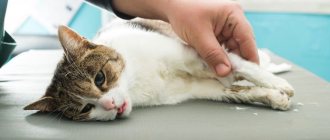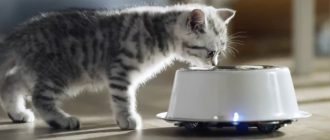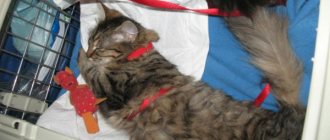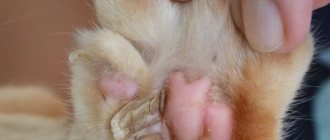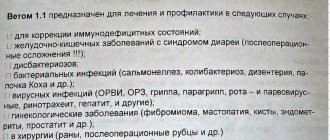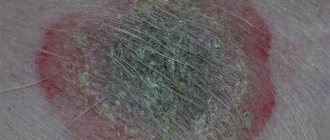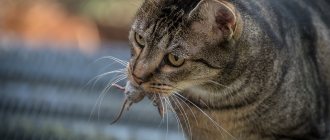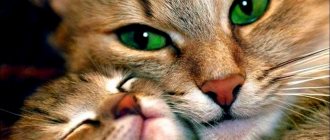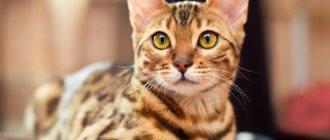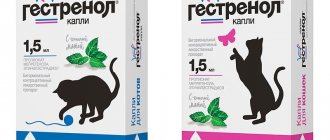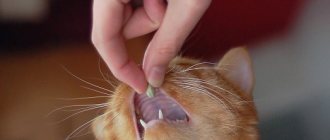Cats, like any living creature, have a need to reproduce, because this is inherent in nature. However, the pregnancy of pets is not always a joyful event for their owners, since in the future this can result in a number of problems. The main one is where to place the kittens that are born. Contraceptives for cats will help prevent this situation.
Classification by type of impact
Depending on the composition, contraceptives for cats are divided into two main groups:
1. Drugs with a high content of hormones that cause false pregnancy. If such a contraceptive is taken, the cat calms down, mistakenly believing that it has continued the race.
2. Low-dose hormonal drugs. More modern medications that suppress the cat's need to mate and have a sedative effect.
According to the method of administration, contraceptive drugs are divided into drugs in the form of injections, tablets or drops.
The safest drugs
All hormonal contraceptives for animals, which are available in pet stores, clinics, and veterinary pharmacies, must be given to females from the first to third day after the onset of estrus. Veterinary preparations of plant origin - from the first day.
All medicinal contraceptives can be used in cats after 8–12 months. Otherwise, you can provoke hormonal imbalance, physiological disorders in the body of pets, and endocrine pathologies.
The dosage of veterinary medications that prevent unwanted pregnancy, depending on the composition, is calculated taking into account the body weight of the animals and the physiological characteristics of the body.
The most effective, safe contraceptives for animals:
- Sex barrier. Suppresses sexual desire, corrects unwanted behavior, prevents unwanted fertilization. Produced in drops and tablets.
- Stop intimate. An effective oral contraceptive, the action of which is aimed at suppressing sexual desire and normalizing behavioral signs in cats. Available in bottles in the form of drops on the withers.
- Contrasex in drops, tablets. To prevent unwanted pregnancy. Refers to high-hormonal veterinary drugs.
- Gestrenol. Tablets for oral use. Regulates the behavior of cats during sexual hunting, reduces sexual arousal.
- Nonoestrone. The active ingredient is megestrol acetate. Oral contraceptive tablets for cats. Inhibits ovarian function and is guaranteed to protect against pregnancy. It is acceptable to use in any phase of the reproductive cycle. Corrects the behavior of young cats. During estrus, cats are given one tablet for ten days.
- EX 7.5. A product for regulating sexual heat and behavior of cats. Available in polymer dropper bottles in the form of a suspension or tablets. Can be used for cats and kittens. The active ingredient is megestrol acetate. It has an effect on the hypothalamic-pituitary system, blocks the production of gonadotropic hormones, which leads to suppression of sexual desire. Prescribed to interrupt and delay estrus.
- Ceva Sante Animale (France). A safe medicinal contraceptive for cats, the effect of which is aimed at delaying estrus, suppressing sexual desire, preventing unwanted pregnancy, and eliminating unfavorable behavioral symptoms during sexual activity.
- Libidomin. The veterinary drug inhibits the secretion of sex hormones, prevents the onset of ovulation, and eliminates the aggression of cats during heat.
Gestrenol for cats
When choosing contraceptive medications for your beloved cat, in order not to harm your pet’s health, we strongly recommend consulting with a veterinarian. Do not forget that such veterinary drugs, if used incorrectly or not in compliance with the dosage, can provoke hormonal imbalance, pyometra, endometriosis, cancer, and other serious disorders in the body of animals.
Sex barrier for cats in drops
Contraceptive injections
Today, veterinarians often use Covinan injections as contraceptives, eliminating estrus for up to 6 months. The first injection should be given exclusively by a doctor, and all further injections can be done independently.
The drug should be administered before the onset of estrus, otherwise it will not work. Moreover, it can cause health problems. Contraceptive injections for cats are highly not recommended if the animal is pregnant. Contraindications to taking Covinan are such severe diseases as endometritis and kidney inflammation, because the administration of the drug can lead to complications. Also, the medicine cannot be used if the injection is given for the first time to a cat that has reached 5 years of age.
The advantage of injectable contraceptives is their ease of use and reversibility, that is, after the end of the injection period, the cat is again ready for mating and can become pregnant. If pregnancy is undesirable, a second injection is given.
Types of contraceptives
The market for veterinary pharmacological preparations offers a wide range of contraceptives. Their action can be aimed at suppressing the production of sex hormones, suppressing the desire to mate, preventing unwanted pregnancy and correcting the psycho-emotional state during estrus.
Based on their composition, they can be grouped into 3 groups:
- High-dose hormonal
(based on synthetic hormones). They provoke a false pregnancy with the corresponding symptoms, respectively, the cat has the feeling that the function of procreation has been completed. - Low-dose hormonal.
They belong to the modern generation of contraceptives that suppress sexual desire. - Natural.
They are made on the basis of herbal components, help suppress sexual activity, and have a mild sedative effect.
Manufacturers offer these drugs in different release forms.
Injections
Contraceptive injections for cats have a long period of action (4 to 6 months), during which they will not be in heat. It is recommended to entrust the initial administration of the selected drug to a veterinarian, and all subsequent injections can be done independently a few days before the date of the expected estrus. Among the main advantages: prolonged effect and practically 100% result, but a high risk of side effects and complications. Additional inconvenience may be directly related to the injection procedure: if the animal owner does not have such experience, the help of a partner who can hold the pet will most likely be required.
Injections should not be given to pregnant females, as well as to individuals over 5 years old, if this contraceptive option has not previously been used for them.
Pills
The contraceptive effect of pills can be achieved through the use of synthetic hormones or natural ingredients. The former are considered more effective, but can negatively affect the animal’s body. The latter are virtually harmless, but have a shorter effect, which increases the risk of unwanted pregnancy. In addition, you need to get used to feeding the tablet to your pet so that he cannot spit it out.
Drops
Drops (oral or on the withers) have properties similar to birth control pills and injections, differing from them only in the form of release. The latter also makes it easier to use: it’s easier to drop the solution into the cat’s mouth, and she won’t be able to spit it out. They should be used no later than two days before the start of estrus.
The form of release of contraceptives depends on the composition: herbal preparations are available only in tablets or drops, hormonal drugs - in any of 3 forms.
Pills
Contraceptives for cats in tablets come in two varieties: natural and chemical.
Natural contraceptives are based on the beneficial properties of plants and other natural ingredients. Their effect is usually mild and short-lived. Contraceptive tablets for cats, made from plants, have a sedative effect and calm the animal for a certain time. The advantage of such medicines is that they have a positive effect on the cat’s body and do not contain harmful components.
Chemical contraceptives in tablets affect hormonal levels. After their use, the animal ends its love games and after a certain time calms down. The medication begins to act within 24 hours.
Some manufacturers of contraceptive pills recommend taking birth control continuously, based on the belief that such treatment will help eliminate estrus permanently. In fact, excessive intake of hormones will not only not save your pet from sexual desires, but can also provoke the development of diseases of the reproductive system in the cat.
Types of contraceptives
The market for veterinary pharmacological preparations offers a wide range of contraceptives. Their action can be aimed at suppressing the production of sex hormones, suppressing the desire to mate, preventing unwanted pregnancy and correcting the psycho-emotional state during estrus.
Based on their composition, they can be grouped into 3 groups:
- High-dose hormonal
(based on synthetic hormones). They provoke a false pregnancy with the corresponding symptoms, respectively, the cat has the feeling that the function of procreation has been completed. - Low-dose hormonal.
They belong to the modern generation of contraceptives that suppress sexual desire. - Natural.
They are made on the basis of herbal components, help suppress sexual activity, and have a mild sedative effect.
Contraceptives in drops
Contraceptive drugs in the form of drops have the same properties as tablets. They can also be of natural or chemical origin, but most often such contraceptives are made from natural ingredients. As a rule, these are a variety of herbal infusions and decoctions. The effect of taking drops is not based on the regulation of hormonal levels, but on its imitation. They have the ability to imitate sexual satisfaction, which makes the cat calm until the next heat. However, the drug should be given to animals with caution.
Contraceptive for cats (drops) is easy to use: it is much easier to drop the product into the animal’s mouth than to force it to swallow a pill.
The effect of contraceptives on the cat's body
Most owners think that contraceptive injections and pills are much better than sterilization, but this is not so.
And the question is often asked on the Internet when to start giving birth control to your cat. Never. If you want your pet to live a long time and not get sick, then it is better not to use such products, because they are a time bomb. It doesn’t matter what you give your animal, drops or tablets, they help regulate hormonal levels. Thus, the drug affects not only the production of those same hormones, but also the entire body
If you still decide that you do not want your pet to produce offspring, then it is better to sterilize it, it is effective and safe for the animal’s body. And if you decide to give your cat birth control for some time after giving birth, it is better to consult your doctor.
Popular contraceptives
The most popular today are the following contraceptives (for Maine Coon (cats) as well):
• “Sex barrier” - reduces arousal, protects against unwanted pregnancy and minimizes negative consequences. Available in drops and tablets.
• "Gestrenol" - have a contraceptive effect and inhibit sexual desire in cats. Produced in tablet form.
• “Stop-Intim” is a hormonal contraceptive in drops that suppresses sexual arousal, delays and interrupts estrus in cats.
• “Libidomin” - blocks the onset of ovulation, inhibits the development of estrus, reduces libido. Available in the form of capsules, tablets and drops.
• “Counter-sex” – relieves sexual arousal. Can be purchased both in tablets and drops.
• “Antisex” - popular hormonal drops and tablets that reduce excitability, block ovulation and stop estrus.
Types of contraception for cats
Cats are the most prolific pets. In a year, a female can become pregnant up to 6 times, giving birth to 7 - 8 kittens. Such fertility causes significant problems for the owners of the animal, exhausts the cat itself, worsens its health, reducing life expectancy. Frequent births and the need to accommodate offspring significantly complicate the maintenance of a furry pet.
If the animal is purebred, then the breeder is faced with the problem of regulating the frequency of births. The 3 births recommended by experts in 2 years is difficult to achieve without the use of contraception. Therefore, a responsible owner must control breeding issues and know how to prevent an unwanted pregnancy in a cat.
Modern veterinary medicine offers the following types of contraception:
- oral contraceptives;
- hormonal injections.
Among oral contraceptives, owners are most familiar with the following drugs:
- “Stop-intimacy”,
- "Sex barrier"
- "Contra-sex"
- "Gestrenol"
- "Libidomin"
- "Medro-Pet"
- "Perlutex"
- other.
The active ingredients of these contraceptives are hormones (analogs of progesterone, estradiol, etc.). The drugs are available in the form of tablets and drops for oral administration. The mechanism of action of hormonal contraceptives is to suppress sexual arousal and prevent ovulation. Some hormonal drugs cause a false pregnancy in the cat's body, thus suppressing the sexual instinct. Hormonal contraceptives are used during estrus. In addition to a pronounced effect on the endocrine system, many drugs have a sedative (calming) effect on the nervous system.
What can you give your cat to prevent her from getting pregnant? This is the question that owners of furry pets ask when signs of heat appear. The oral method of protection against unwanted pregnancy is often resorted to due to its simple method of administration. There is nothing complicated about giving your cat a pill or drops. However, you should be aware that uncontrolled use of such drugs leads to health problems in animals. It is undesirable to use oral contraceptives in individuals over 5 years of age who have not previously used hormonal drugs due to the risk of developing serious diseases.
Steroid sex hormones affect not only the animal’s brain, inhibiting reproductive instincts and inhibiting ovulation, but also almost all internal organs and tissues.
Removed uterus and ovaries due to pyometra (purulent inflammation of the uterus)
The most common side effect of hormonal contraception is pyometra. This is a serious disease, as a result of which pus accumulates in the uterine cavity. The pathology is dangerous not only for the health, but also for the life of the pet.
Uncontrolled use of hormonal contraceptives is fraught for the animal with hormonal imbalance and, in connection with this, the development of the following pathologies:
- neoplasms in the uterus, including malignant ones;
- ovarian cysts;
- glandular hyperplasia of the uterus;
- breast oncology.
The side effects of hormonal oral contraceptives are not limited to the effects of the drugs on the reproductive system. Steroid hormones, which form the basis of the drugs, reduce the body's sensitivity to the hormone insulin. As a result, the animal develops diabetes mellitus and the functioning of the endocrine glands is disrupted. The liver, pancreas, and genitourinary system of the animal suffer from the action of hormonal drugs.
The best way to prevent an unwanted pregnancy in a cat is to consult a veterinarian. Recently, hormonal injections with a long-term contraceptive effect have been gaining popularity. For this purpose, Covinan is used, which is a veterinary contraceptive developed in the Netherlands. The active ingredient of the drug is a synthetic analogue of progesterone (prolygestone). The hormone inhibits (slows down) the production of sex hormones in the pituitary gland and inhibits the synthesis of estradiol in the ovaries. This leads to the prevention of the onset of estrus. Administration of the drug during the sexual rest phase prevents the process of ovulation.
Owners should be aware that Covinan is administered according to a certain schedule, and after discontinuation of the drug, the animal goes into estrus within 2-3 weeks. The peculiarity of a hormonal contraceptive is that it is used strictly before the onset of estrus in a cat. Therefore, the first injection should be carried out at a veterinary institution after examining the pet. The drug has a number of contraindications; it is used with caution in metabolic diseases and diabetes.
Often a veterinarian is asked about how to terminate a cat’s pregnancy. If for some reason surgical intervention is impossible, medical termination of pregnancy is used. For this purpose, estrogens are used, which are administered to the animal 1 to 3 weeks after mating. The use of these hormones leads to serious consequences in the form of pyometra, infertility, and disruption of the functioning of internal organs.
For a period of 3-6 weeks, prostaglandins are used to provoke a miscarriage. The consequences of such drugs are bleeding and the development of purulent inflammation of the uterus.
At a later stage (6 - 9 weeks), a cat's pregnancy can be terminated with glucocorticoids. The drugs also cause miscarriage in the animal.
The owner should understand that medical termination of pregnancy in a pet is far from a safe method of getting rid of fetuses. Hormonal termination of pregnancy is fraught with complications that are dangerous to the cat’s health and life, and such methods should be used only in extreme cases.
We recommend reading the article about when a cat goes into heat for the first time. From it you will learn what estrus is, at what age estrus occurs, signs of puberty and drugs to reduce sexual desire.
Sterilization as an alternative to contraceptives
Of course, contraceptive drugs, due to their ease and reliability of use, are in great demand. However, they are good to a certain extent. Veterinarians consider contraceptives harmful, because hormonal intervention, even in small doses, does not go away without leaving a trace. Contraceptive medications can cause side effects and negatively impact your pet's health. Therefore, if the owners categorically do not accept a new addition to the cat family, then the most humane option would be to carry out the sterilization procedure.
The advantage of this method of contraception is that it provides a permanent effect and reduces the risk of developing cancer in cats.
Today, there are three options for sterilization: medication, chemical and radiation.
The effect of contraceptives on the body
When faced for the first time with the question of what to do to prevent a cat from becoming pregnant, some breeders begin to make mistakes because they do not know how this or that remedy works.
People who do not have veterinary education pay attention to the so-called “natural” contraceptives for cats. However, such herbal remedies do not have the effect of regulating sexual desires in an animal and are not able to prevent accidental conception.
They only help stabilize the pet’s mental state, reducing its nervous excitement. In case of sexual intercourse, they will not have any contraceptive effect. In addition, the effect of them is achieved only after a long course of administration.
Synthetic or chemical drugs come in two varieties:
- monohormonal, which contains only one hormone;
- bihormonal, they contain two hormones at once.
Monohormonal drugs that contain megestrol acetate have the desired effect only at high concentrations, which can negatively affect the animal. Bihormonal ones contain two hormones or analogues of animal hormones, due to which their concentration in the preparations is lower and the pet’s hormonal background is regulated more delicately.
Cat in heat
Important! Drugs from both groups, acting on the cat’s body, change hormonal levels, as a result of which the cat loses the ability to become pregnant due to lack of ovulation
Contraceptives for cats: which is better?
Hormonal contraceptives, according to veterinarians, are considered a very effective way to prevent unwanted pregnancy in cats. The choice of a particular drug should be made on the basis of a joint decision between the doctor and the animal owner. In addition to effectiveness, it is also important to consider the safety of the drug for the health of your pet.
There is an opinion that the use of certain contraceptives can cause infertility, diseases of the uterus and ovaries in cats, and even cause cancer. Such pathologies do sometimes occur. In particular, this applies to cases where drugs with a high content of hormones were taken. With the correct selection of a contraceptive and its dosage, all risks are minimized.
However, the best and most reliable method of cat contraception is sterilization. The best time to carry it out is the period between the first and second estrus, that is, when the animal is 8-10 months old.
Effect on the cat's body
The thoughtless use of any contraceptive drugs can provoke hormonal imbalance, the development of endometriosis, pyometra, cancer and other serious health problems. They can also lead to disruption of the animal's reproductive function and its ability to bear viable offspring (kittens are stillborn). Therefore, before use, you should at least carefully study the instructions, adhere to the recommended dosages and take into account the initial state of health of the pet, and even better, first consult with a veterinarian. But even in such conditions, the risk of complications is quite high.
Hormonal contraceptives are categorically not suitable for pregnant and lactating individuals, animals with chronic pathologies or tumor formations of the reproductive system. Such drugs are also not recommended in the presence of diabetes mellitus and endocrine disorders.
Most veterinarians confirm the negative effects of contraceptives on the body of cats, especially when used regularly. To prevent unwanted pregnancy, it is recommended to use drugs no more than 1-2 times and only for young, completely healthy individuals. If your pet has chronic diseases or is simply elderly, contraceptives can cause even more harm. From the point of view of breeders and veterinarians, the only correct and safe method to prevent an animal from becoming pregnant is sterilization.
As for the use of birth control pills after childbirth, they should not be given during the very first estrus, as well as during the feeding period of kittens, which can lead to poisoning of the offspring. The best option here would also be sterilization after the kittens grow up.
